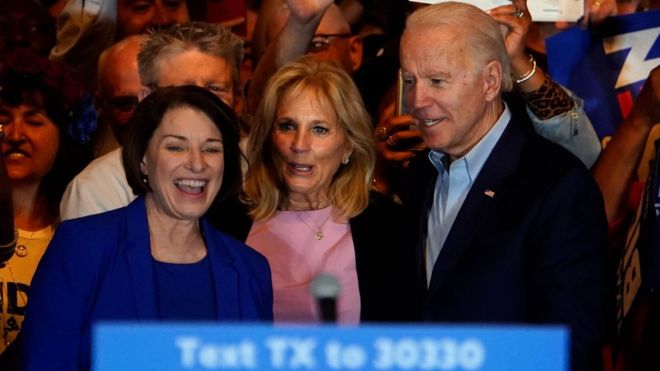
Joe Biden has won nine of the 14 states that voted to pick a Democratic White House candidate on Super Tuesday, a remarkable rebound for his campaign.
The former US vice-president overturned predictions to narrowly take the key state of Texas from his main challenger, Bernie Sanders.
However, Mr Sanders is projected to win California – the biggest prize of the night – as well as three other states.
They lead the race to face Republican President Donald Trump in November.
Former New York mayor Michael Bloomberg spent more than half a billion dollars of his own money on his campaign, but did not win a single state.
Super Tuesday awards more than 1,300 of the 1,991 delegates needed to clinch the Democratic White House nomination in July. As things stand, Mr Biden has 402 delegates and Mr Sanders 314.
How important is Biden’s performance?
As well as Texas, Mr Biden took Massachusetts, Minnesota, Oklahoma, Arkansas, Alabama, Tennessee, North Carolina and Virginia.
Virginia and North Carolina are crucial because they are key swing states in the 2020 election.
Exit poll data across the board suggests Mr Biden – who was vice-president to Barack Obama – has attracted large majorities of African-American voters, a crucial bloc for the Democratic party.
Mr Biden also appears to have won among the type of suburban voters who pollsters say have been turning away from the current US president.
“We are very much alive,” Mr Biden told a crowd in Los Angeles. “Make no mistake about it, this campaign will send Donald Trump packing.”
How is Sanders doing?
If Mr Sanders does win California, as the Associated Press news agency projects, he will pick up the lion’s share of the whopping 415 delegates that the Golden State sends to the party convention.
The left-wing senator also won his home state of Vermont, along with Colorado and Utah.
The second-biggest voting state of the night was Texas. Mr Sanders had been heavily favoured to win the Lone Star State, but it was finally claimed by Mr Biden.
Partial results from Maine’s primary also show Mr Sanders and Mr Biden neck and neck.
In a victory speech, Mr Sanders lambasted Mr Trump, but also took a shot at Mr Biden.
“We’re taking on the political establishment,” he said. “You cannot beat Trump with the same-old, same-old kind of politics.”
How did Biden bounce back?
Joe Biden came into Super Tuesday hoping his momentum from a surprisingly big South Carolina win would translate into a strong showing in some of the Super Tuesday states and allow him to keep within sight of Bernie Sanders in the delegate count.
By that metric, his evening succeeded beyond his best expectations.
His support among black voters, which was on display in South Carolina, was replicated across the South and helped offset Bernie Sanders’ strength with Hispanic voters in Texas.
The endorsements mattered too – in Dallas on Monday, he had the support of Amy Klobuchar, Pete Buttigieg and Beto O’Rourke, and he ended up greatly over-performing his polls in that state and winning Klobuchar’s Minnesota.
But now the hard work begins. He is in for a state-by-state slog against Mr Sanders that could stretch all the way to the Democratic National Convention in July.
He’ll have to fundraise and organise rapidly to make up for the Vermont senator’s advantages. Meanwhile, Republicans are going to start training their fire on him – again.
If he ends up winning the nomination, after being left for dead just a few weeks ago, he will have earned it.
How did Bloomberg and Warren do?
Senator Elizabeth Warren, once the frontrunner in the race, suffered a humiliating defeat to Mr Biden in her home state of Massachusetts.
Mr Bloomberg could only pick up a consolation win in the tiny US territory of American Samoa.
He has, however, garnered enough votes in California and Texas to pick up delegates, according to incomplete results.
Mr Bloomberg was appearing on a presidential ballot for the first time after skipping all four contests last month.
Source: BBC

